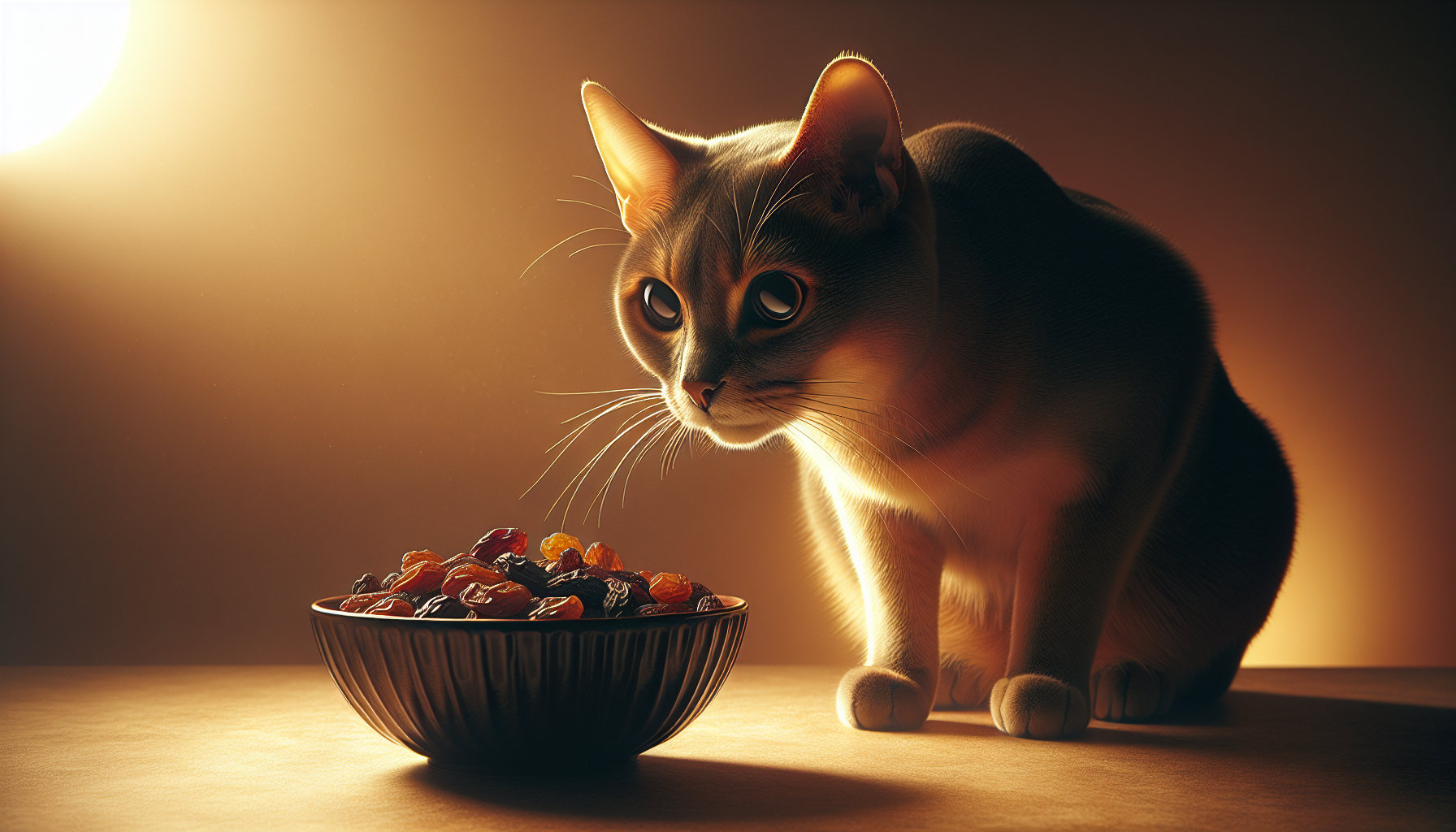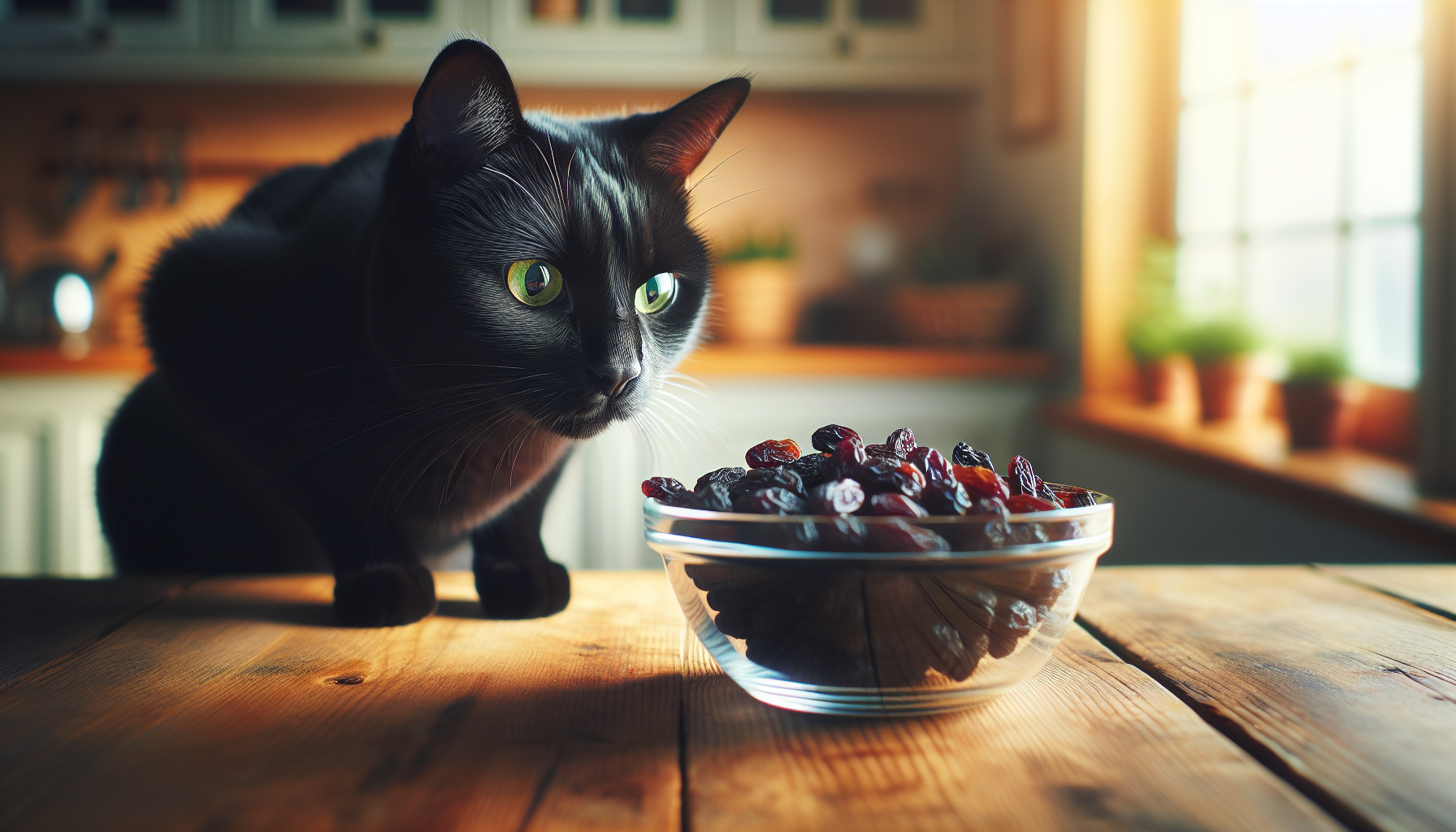In this article, we will explore the topic of whether cats can eat raisins. As a cat owner, you may have wondered if it’s safe for your feline friend to snatch a raisin or two. Raisins are a popular dried fruit that many of us enjoy as a snack, but what about our furry companions? We will provide you with some important information and considerations to keep in mind when it comes to feeding raisins to your cat. So, let’s discover if cats can safely enjoy this tasty treat or if it’s best to keep raisins far away from their curious paws.
What are raisins?
Raisins are dried grapes that have a sweet and chewy texture. They are widely enjoyed as a snack and used in various culinary preparations. These small, wrinkled fruits are packed with flavor and are often added to baked goods, salads, and trail mixes for an extra burst of sweetness.
Definition
Raisins are grapes that have been dried naturally or through artificial methods such as sun drying or dehydration. The drying process removes most of the water content, resulting in a concentrated, shriveled fruit. Raisins can be made from different varieties of grapes, including green, red, or black grapes.
Composition
Raisins are composed mainly of carbohydrates, primarily natural sugars like glucose and fructose. They also contain a small amount of dietary fiber, which can aid in digestion. Additionally, raisins contain trace amounts of vitamins and minerals, including potassium, iron, and certain B vitamins.
Nutritional Value
While raisins do have some nutritional benefits for humans, such as providing energy and a small amount of fiber, it’s important to note that cats have different dietary requirements. Cats are obligate carnivores, meaning they require a diet primarily made up of meat. Consequently, the nutritional value of raisins is not significant for cats and does not contribute to their overall well-being.
Risks of Feeding Raisins to Cats
Feeding raisins to cats can pose serious health risks. Cats’ bodies are not designed to process certain compounds present in raisins, which can lead to toxicity and potentially life-threatening consequences.
Toxicity in Cats
Raisins and grapes are toxic to cats, although scientists are yet to determine the exact toxic mechanism or the specific compound responsible for the toxicity. The toxic effects of raisins can occur even in small amounts and can affect cats of all ages, breeds, and sizes. It is crucial to understand that any amount of raisin ingestion can be considered hazardous for feline friends.
Potential Health Consequences
Ingesting raisins can have detrimental effects on cats’ health. Some of the potential consequences include acute kidney failure, gastrointestinal upset, and digestive disturbances. Cats may experience vomiting, diarrhea, abdominal pain, decreased appetite, and lethargy as a result of raisin consumption.
Symptoms to Watch For
It’s important to be vigilant and look out for any signs of raisin toxicity in cats. Symptoms may include excessive thirst, increased urination, decreased urine production, weakness, tremors, seizures, and in severe cases, coma or death. If you suspect that your cat has ingested raisins or is exhibiting any concerning symptoms, it’s crucial to seek veterinary assistance immediately.

This image is property of images.unsplash.com.
Why Are Raisins Harmful to Cats?
The exact reasons why raisins are harmful to cats are still unknown. However, research suggests that toxic substances present in raisins, along with their impact on cats’ digestive system and kidney function, are the primary factors contributing to their harmful effects.
Toxic Substances
Raisins contain substances that can be toxic to cats, but the specific compounds responsible have not been identified. It is believed that these substances can cause damage to cats’ organs, particularly the kidneys, leading to severe health complications.
Effects on Cats’ Digestive System
When cats ingest raisins, it can trigger gastrointestinal disturbances. The intestinal lining may become irritated, leading to symptoms such as vomiting, diarrhea, and abdominal pain. The digestive system can become compromised, making it difficult for cats to absorb nutrients properly.
Impact on Kidney Function
Raisins have been strongly associated with kidney failure in cats. The toxic components of raisins can disrupt cats’ kidney function, inhibiting their ability to filter waste products from the blood and maintain proper fluid and electrolyte balance. This can lead to kidney damage, which is potentially irreversible and life-threatening.
Other Fruits That Are Not Safe for Cats
While raisins are particularly harmful to cats, it’s essential to be aware of other fruits that should be avoided when it comes to feline consumption. Grapes, currants, and sultanas are fruits closely related to raisins and can have similar toxic effects on cats.
Grapes
Grapes, like raisins, are toxic to cats and can cause severe health complications. As with raisins, the exact reason behind their toxicity remains unknown. The same precautions should be taken to ensure cats do not ingest grapes or any food containing grape products.
Currants
Currants, similar to grapes and raisins, should be kept away from cats. Whether they are fresh or dried, currants can potentially harm cats and can lead to similar symptoms of gastrointestinal upset and kidney damage.
Sultanas
Sultanas, which are dried white grapes, share the same toxic properties as raisins and should be avoided. Their small size and wrinkled texture make them appealing to cats, but it is important to remember that even a small amount of sultana ingestion can be extremely dangerous.

This image is property of images.unsplash.com.
Healthier Alternatives to Raisins for Cats
Knowing that raisins and other related fruits are harmful to cats, it’s essential to explore healthier alternatives that can satisfy cats’ occasional cravings for a snack.
Cat-Friendly Fruits
While some fruits can be dangerous for cats, a few options can still be offered in moderation. Cats can enjoy small portions of fruits such as apples and bananas. However, it’s crucial to remove any seeds, peels, or cores before sharing these fruits with your feline friend.
Vegetables as Treats
Many vegetables can serve as an excellent alternative to fruits for cats. Options like cooked carrots, green beans, or steamed broccoli florets can offer feline-friendly snacking options. Always ensure that any vegetables offered are free from seasonings, butter, or oils that might be harmful to cats.
Consulting with a Veterinarian
When in doubt about suitable snacks or treats for your cat, it’s always best to consult with a veterinarian. A veterinarian can provide individualized advice based on your cat’s specific needs, dietary restrictions, and overall health.
Actions to Take If a Cat Ingests Raisins
If you suspect or witness your cat ingesting raisins, it is crucial to act promptly to mitigate potential harm.
Recognizing the Ingestion
Not all cases of raisin ingestion may be immediately apparent. Sometimes, cats can get into foods or accidentally ingest raisins without your knowledge. It’s important to be observant and vigilant, especially if you have raisins or raisin-containing foods within your cat’s reach.
Immediate Steps to Take
If you are certain that your cat ingested raisins, take the following immediate steps:
- Remove any remaining raisins: If there are still raisins or raisin-containing food accessible to your cat, remove them immediately to prevent further ingestion.
- Do not induce vomiting: Unlike for some other toxins, attempting to induce vomiting is not recommended in cases of raisin ingestion. It is best to seek veterinary advice rather than taking matters into your own hands.
- Monitor your cat closely: Keep a close eye on your cat’s behavior and look out for any symptoms of toxicity or gastrointestinal upset. Note down any changes you observe to communicate them accurately to your veterinarian.
Contacting a Veterinarian
It is crucial to contact a veterinarian as soon as possible if you suspect your cat has ingested raisins. Even if your cat is not currently showing any symptoms, it is advisable to seek professional advice. The veterinarian will provide guidance tailored to your cat’s situation and may want to perform relevant diagnostic tests to assess potential internal damage.

This image is property of images.unsplash.com.
Preventing Raisin Consumption in Cats
Prevention is always better than dealing with the consequences of raisin ingestion. By taking a few simple precautions, you can significantly reduce the risk of accidental raisin consumption in your cat.
Keeping Raisins Out of Reach
Ensure that all raisin-containing foods, snacks, or products are securely stored in a location that is inaccessible to your cat. Remember that cats are agile climbers and can reach much higher than expected, so be cautious when storing potentially harmful foods.
Educating Family Members or Friends
If you have visitors or live in a household with other family members or friends, it is crucial to educate them about the dangers of raisin ingestion. Remind them that cats should never be fed raisins or any other food known to be harmful to felines.
Monitoring Food Sharing and Accidental Access
If you have other pets or children in the household, it’s important to closely monitor any occasions where food sharing or accidental access to raisins or other dangerous foods may occur. Always supervise interactions between pets and children, and ensure that any food offered to cats is safe and appropriate for their consumption.
Understanding Individual Cat Sensitivities
It’s important to note that cats can vary in their individual sensitivities and responses to certain foods. While raisins are generally considered toxic to cats, some cats may have a higher tolerance or exhibit different reactions. It is essential to understand and respect each cat’s unique sensitivities.
Variation in Cats’ Reactions
Just as humans may have varying reactions to certain foods or substances, cats can also exhibit individual differences in their response to raisins. While these cases may be rare, it highlights the importance of vigilance and taking appropriate precautions even if your cat has not shown any adverse reactions to raisins in the past.
Determining Unique Tolerances
If you suspect your cat may have consumed raisins or was accidentally exposed to them, it is crucial to seek veterinary attention regardless of whether you observe any symptoms. A veterinarian can evaluate your cat’s individual tolerance and response to raisins and provide tailored advice accordingly.
Effect of Breed and Age
Certain cat breeds and age groups may be more vulnerable to the toxic effects of raisins. It is important to keep this in mind and discuss your cat’s specific circumstances with a veterinarian to better understand potential risks and necessary measures.

Consequences of Feeding Raisins to Cats
Feeding raisins to cats can have severe consequences, both in the short term and in the long run. It is essential to be aware of these potential outcomes to prevent any harm to your feline companion.
Acute Toxicity
Raisins can cause acute toxicity in cats, leading to immediate health issues. Acute toxicity can manifest as gastrointestinal distress, kidney failure, or even death in severe cases. It is crucial to take quick action if raisin ingestion is suspected to minimize the risk of acute toxicity.
Chronic Health Issues
In some instances, raisin ingestion can result in chronic health problems for cats. Kidney damage may occur over time, leading to a decreased quality of life and ongoing health management needs. Preventing raisin consumption can significantly reduce the risk of chronic health complications.
Long-Term Complications
The long-term consequences of raisin ingestion in cats can be severe and potentially irreversible. Kidney damage, in particular, can have long-term implications for a cat’s overall health and well-being. By understanding the dangers of raisins and taking appropriate preventive measures, cat owners can help safeguard their furry friends from long-term complications.
Conclusion
In conclusion, raisins should never be fed to cats or allowed access to them. The toxic effects of raisins can cause significant harm to cats, leading to various health complications, ranging from gastrointestinal upset to kidney failure. It is crucial to be proactive in preventing raisin ingestion and to seek immediate veterinary attention if ingestion is suspected. By understanding the potential risks associated with raisins and making informed choices about what foods are safe for cats, we can keep our feline companions healthy, happy, and free from harm.


